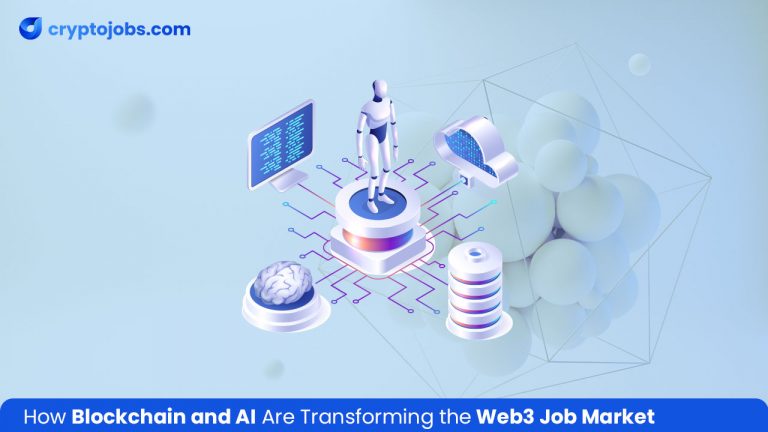
How Blockchain and AI Are Transforming the Web3 Job Market?
- cryptojobs.com
- January 22, 2024
- All Posts, Blockchain, Web3
- 0 Comments
Web3 is an open network web architecture that allows users to interact with each other without the need for intermediaries. It is an ever-evolving landscape where decentralization, transparency, and smart contracts reign supreme. And their intersection with artificial intelligence (AI) has further unleashed a new wave of innovation. The integration of all these technologies has opened up exciting possibilities for enhanced security, improved mining operations, and optimized trading processes. Plus, it has also revolutionized the job market in unimaginable ways.
Since Web3 operates on a decentralized framework, users have greater control over their data and online interactions. In this setup, no single entity has complete authority over the network. Instead, a decentralized community of developers, consumers, and nodes maintains the network. This innovative model has created numerous blockchain and AI jobs, attracting individuals with a wide range of skills and talents.
Let’s look at how blockchain and AI are transforming the Web3 job market.
Decentralized Hiring Platforms
Decentralized hiring platforms leverage blockchain technology to redefine the recruitment process. They introduce transparency, security, and efficiency into transactions using smart contracts. Smart contracts are self-executing agreements encoded on the blockchain. They eliminate the need for intermediaries, facilitating direct interactions between employers and candidates to ensure seamless and tamper-proof agreements.
These platforms are transforming the AI jobs market in more than one way. Using AI, employers can access a global talent pool, and professionals can explore new blockchain jobs without relying on traditional methods. The open nature of decentralized platforms not only streamlines the hiring process but also promotes a more inclusive and accessible Web3 job market.
Credentialing and Skill Verification
According to a 2017 CareerBuilder survey, 75% of employers have caught candidates lying on their resumes. However, with the integration of blockchain, credentialing and skill verification have undergone a significant transformation.
Being decentralized in nature, blockchain offers a secure and transparent system where recruiters can verify professional credentials in a tamper-resistant ledger. And since there are no intermediaries involved, the applicant’s privacy is also protected during the verification process.
AI further complements this framework. It employs algorithms to assess and verify specific skills. Through this, employers can have confidence in the accuracy and legitimacy of candidates’ skill sets, contributing to a more reliable and trust-based hiring process.
Automated Payments
Smart contracts also play a vital role in automating and securing payments within the Web3 job market. Coded with predefined rules, these self-executing contracts trigger automated actions upon fulfillment of specified conditions.
In context with blockchain jobs, smart contracts facilitate a trustworthy and transparent payment process. As Web3 professionals fulfill the agreed-upon terms of their AI jobs, payment transactions occur automatically. This streamlines the payroll procedure, providing a secure and tamper-proof method for compensation.
AI-Powered Job Matching and Recruitment
AI-powered job matching and recruitment represent a pivotal shift in modern hiring practices. Technology has streamlined the talent acquisition process through advanced algorithms and machine learning. These intelligent systems are trained to crossmatch job requirements and candidate profiles with a precision that surpasses traditional methods.
By leveraging AI, organizations can efficiently identify candidates whose skills align with job specifications. By analyzing diverse data points, such as skills, experience, and preferences, it identifies the most suitable candidates for specific roles. Moreover, machine learning algorithms contribute to reducing biases in the recruitment process, fostering a more diverse and inclusive workforce.
Its integration also enhances accuracy by continually refining the matching criteria based on real-time data. This approach is particularly advantageous in the dynamic and decentralized Web3 ecosystem, where specialized skills are required for various AI and blockchain jobs.
Decentralized Autonomous Organizations (DAOs)
Decentralized Autonomous Organizations (DAOs) represent a significant shift in organizational structures within the Web3 job market. These organizations operate on blockchain technology, employing smart contracts to automate decision-making processes. They are characterized by decentralized governance, with members collectively contributing to decision-making through voting mechanisms.
DAOs operate without traditional hierarchical structures by leveraging the principles of transparency and consensus through code execution. Their functionality is further enhanced by AI, which provides data-driven insights for informed decision-making.
The intersection of blockchain, AI, and DAOs is offering a new approach to employment within the Web3 ecosystem. They are redefining traditional employer-employee relationships and fostering a more community-driven and participatory approach to work.
Digital Ownership and NFTs
Digital ownership is also transforming with the advent of Non-Fungible Tokens (NFTs). NFTs are Web3 building blocks that provide a secure and transparent means of representing ownership of unique digital assets, such as artwork, music, and virtual real estate. Unlike traditional digital files, NFTs are authenticated and verifiable through blockchain records.
Each NFT is a distinctive, indivisible token with a unique identifier, immutably recorded on the blockchain. This record enables consumers to trace its ownership. The innovation has profound implications across various industries, allowing creators and artists to tokenize and sell their digital creations.
As we move towards Web3, NFTs open doors for many people who are tech-savvy and have a passion for art and culture. Content creators can also tokenize their work and offer it directly to consumers, collecting royalties as they go. The broader implications of NFTs extend to industries like gaming, where in-game assets can now be owned and traded securely.
The Bottom Line
The synergy of blockchain and AI is ushering the Web3 job market into an era of decentralized, transparent, and efficient employment dynamics. It is changing the way we work by setting the stage for a more accessible, collaborative, and equitable future. Decentralized hiring platforms, AI-driven credentialing, and automated payment systems are revolutionizing how individuals and organizations engage in the gig economy. Smart contracts and DAOs, on the other hand, are altering traditional organizational structures, promoting community-driven initiatives. Since Web3 is the future, it is essential that organisations and professionals embrace these innovations. Otherwise, they risk falling behind in the competitive landscape.




